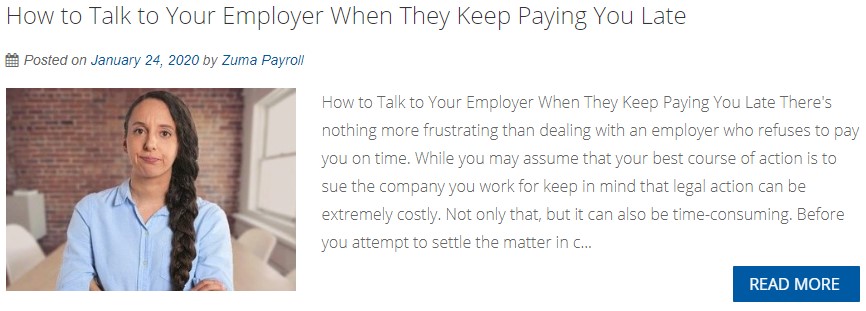Is It Illegal To Pay My Employees Late?
Is It Illegal To Pay My Employees Late?
Following the law regarding employee pay is important to avoid lawsuits and costly penalties. It is illegal to pay your employees late, and doing so could result in legal action.
Here’s what you need to know about late payment of employees.
Federal Law Regarding Late Payment
The federal government created the Fair Labor Standards Act (FLSA) to protect laborers. Each state also sets its own employment laws, but since the FLSA is a federal law, employers nationwide must follow it.
The FLSA states that employers must pay their employees promptly for all the hours those employees have worked. While the term “prompt” doesn’t set a specific timeline, what it means is that employers must pay their employees on the next payday after a pay period ends, and they must pay employees for all the hours they’ve worked, including any overtime.
There are two potential legal penalty if an employer doesn’t pay its employees, and in these situations, a late payment is considered the same as no payment. The penalty depends on whether the nonpayment was willful.
A willful nonpayment essentially means that the employer knew it was failing to pay its employees by the required date. It either knew that it was in violation of the FLSA or it wasn’t considering whether it may be violating the FLSA. With a willful nonpayment, the employer must pay liquidated damages to the employee, with the liquidated damages being equal to the amount that the employer didn’t pay on time. This penalty is in place so employers don’t withhold employee pay.
For example, let’s say that you have cashflow problems and you end up paying an employee one week late. Since a late payment is treated the same as a nonpayment in the eyes of the law and you willfully didn’t pay your employee, you would owe that employee another paycheck for an equal amount to cover the liquidated damages. If you hadn’t paid your employee anything yet, you would owe them two paychecks. As you can see, late payments can become very costly for your business.
Most nonpayments will fall under the willful category, and the burden of proof will be on the employer to prove that it didn’t willfully fail to pay the employee. If the court finds that the nonpayment wasn’t willful, the employer will only need to pay the standard paycheck amount. For a late payment, the employer has already done this and no further action will be needed.
What are some situations where the court may determine that a late payment wasn’t willful on the employer’s part? The court will likely decide that it wasn’t willful on the employer’s part if the late payment was due to issues outside the employer’s control. For example, if you have a medical issue on the day you were supposed to pay your employees the court may avoid any liquidated damages.
States Laws Regarding Paydays
The state where you do business and the industry you’re in determine how frequently you must pay your employees. It’s important to understand your states payday laws so you can make sure that you’re paying your employees on time.
There are four standard types of payment frequencies: weekly, bi-weekly, semi-monthly and monthly.
Weekly and monthly payday laws obviously require you to pay your employees every week or every month. Bi-weekly payday laws require you to pay employees every two weeks, while semi-monthly payday laws require you to pay them twice per month.
States may have slightly more complex payday laws. Arizona is one such example. While the state requires semi-monthly paydays, it also requires that there isn’t more than 16 days between paydays, which means you couldn’t just pay your employees twice at the end of the month.
In some states, pay frequency also depends on the employee’s occupation. For example, New York requires weekly pay for manual workers and semi-monthly pay for all other workers, although if the labor department approves of it, you can pay a manual employee semi-monthly. Many states have more than one acceptable payment frequency, such as Alaska, which allows semi-monthly or monthly payments.
Check with your state’s labor board and read up on its employment laws to make sure that you set up appropriate pay periods.
What Happens If You Pay an Employee Late?
Whether you end up with legal penalties for paying an employee late will depend on how the employee wants to handle the situation. Even though state laws differ, there is a typical procedure that employees must follow.
The first step for the employee is to contact you about a late payment. If you still fail to pay the employee or you pay them but the employee feels you should also pay damages, they can contact the labor board in your state to get a claim started. Another option for the employee is going directly to small claims court.
A claim or a court case could result in you being penalized and needing to pay liquidated damages. If you end up hiring a labor attorney, you’ll also have attorney fees, along with other court costs.
Now, is it likely for an employee to sue you or file a claim with you over a late payment? Not unless absolutely necessary, because it takes time and money for them to do so. That’s why you should get the situation corrected as soon as possible by paying the employee what you owe them.
One instance of a late payment likely won’t result in a lawsuit, although you should still do your best to avoid it. Lawsuits and claims are typically the result of either refusing to pay an employee what they’re owed or repeatedly paying employees late. Stay on top of things at payday and you won’t have a problem.
If you have been paid late or not at all, checkout our article on how to properly confront your employer.


